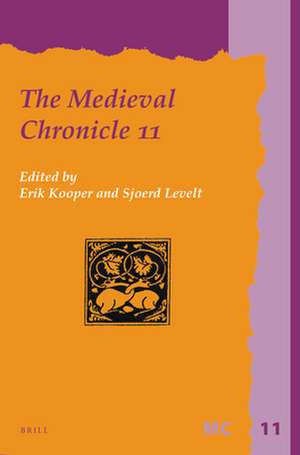The Medieval Chronicle 11: The Medieval Chronicle, cartea 11
Erik S. Kooper, Sjoerd Levelten Limba Engleză Paperback – 8 noi 2017
There are several reasons why the chronicle is particularly suited as the topic of a yearbook. In the first place there is its ubiquity: all over Europe and throughout the Middle Ages chronicles were written, both in Latin and in the vernacular, and not only in Europe but also in the countries neighbouring on it, like those of the Arabic world. Secondly, all chronicles raise such questions as by whom, for whom, or for what purpose were they written, how do they reconstruct the past, what determined the choice of verse or prose, or what kind of literary influences are discernable in them. Finally, many chronicles have been beautifully illuminated, and the relation between text and image leads to a wholly different set of questions.
The Medieval Chronicle is published in cooperation with the Medieval Chronicle Society (medievalchronicle.org).
Preț: 419.39 lei
Preț vechi: 493.41 lei
-15% Nou
Puncte Express: 629
Preț estimativ în valută:
80.25€ • 83.79$ • 66.27£
80.25€ • 83.79$ • 66.27£
Carte indisponibilă temporar
Doresc să fiu notificat când acest titlu va fi disponibil:
Se trimite...
Preluare comenzi: 021 569.72.76
Specificații
ISBN-13: 9789004341586
ISBN-10: 9004341587
Pagini: 296
Dimensiuni: 155 x 235 mm
Greutate: 0 kg
Editura: Brill
Colecția Brill
Seria The Medieval Chronicle
ISBN-10: 9004341587
Pagini: 296
Dimensiuni: 155 x 235 mm
Greutate: 0 kg
Editura: Brill
Colecția Brill
Seria The Medieval Chronicle
Cuprins
PrefaceList of Contributors1 Eyewitness and Medieval Historical NarrativeMarcus Bull2 La Chronique de Memmingen : histoire et luttes politiques dans une ville d’ Empire au XVe siècleDominique Adrian3 Le rôle du connecteur car (ou nam/enim) dans la prose historique : connecteur interphrastique ?Anders Bengtsson4 The Vindication of Sancho II in the Crónica de Castilla: Political Identity and Historiographical Reinvention in Medieval Castilian ChroniclesKim Bergqvist5 Faux Pas in the Chronicles: What is a Pas d’ armes?Cathy Blunk6 The Perception and Evaluation of Foreign Soldiers in the Wars of King Peter I of Cyprus: The Evidence of the Cypriot Chronicles and Its ShortcomingsNicholas Coureas7 ‘Toujours loyal’: A Middle Dutch Chronicle of Flanders by Jan van Dixmude in Sixteenth-Century GhentLisa Demets8 Using an Example: Denis Sauvage, Philippe de Commynes and the ‘Vieil Exemplaire’Catherine Emerson9 Reassessing Spanish Chronicle Writing before 900: The Tradition of Compilation in Oviedo at the End of the Ninth CenturyRodrigo Furtado10 Decennovenal Reason and Unreason in the C-Text of Annales CambriaeHenry Gough-Cooper11 The Battle of Gallipoli 1416: A Detail Rescued from a ChronicleJohn Melville-Jones12 The Origins of the Polish Piast Dynasty as Chronicled by Bishop Vincent of Kraków (Wincenty Kadłubek) to Serve as a Political Model for His Own Contemporary TimeGrischa Vercamer13 Review: The Chronicle of Amadi, Translated from the Italian by Nicholas Coureas and Peter EdburyKarl Borchardt14 Review: Éloïse Adde-Vomáčka, La Chronique de DalimilIvan Hlaváček15 Anthony Munday’s ‘Briefe Chronologicall Suruay Concerning the Netherlands’ and the Medieval Chronicle Tradition of Holland in the Early Modern Period: Introduction and EditionSjoerd Levelt
Notă biografică
Erik Kooper received both his MA and Ph.D. degrees from Utrecht University, where he taught Old and Middle English until his retirement in 2007. Since then he has regularly taught courses and given guest lectures both at his own university, the Nijmegen Radboud University, and abroad. His recent publications include an edition of the Middle English poem Arthur (2011), and several articles, mostly on Middle English historiographical texts.
Sjoerd Levelt is Assistant Professor at the Program in Cultures, Civilizations and Ideas at Bilkent University, Ankara. He studied Dutch and English Medieval Studies in Amsterdam, Berkeley and Oxford, received his Ph.D. in Combined Historical Studies at the Warburg Institute, and previously taught at the Universities of Exeter and Sussex. He is a fellow of the Royal Historical Society and was awarded the Society for Renaissance Studies Book Prize 2012.
Sjoerd Levelt is Assistant Professor at the Program in Cultures, Civilizations and Ideas at Bilkent University, Ankara. He studied Dutch and English Medieval Studies in Amsterdam, Berkeley and Oxford, received his Ph.D. in Combined Historical Studies at the Warburg Institute, and previously taught at the Universities of Exeter and Sussex. He is a fellow of the Royal Historical Society and was awarded the Society for Renaissance Studies Book Prize 2012.
Recenzii
"Přechod k novému vydavateli umožnil lepší grafickou úpravu stránky a užití nového typu písma, především pak umístění poznámek pod text místo na konec studií (Trl.: The transition to a new publisher enabled a better graphic design of the page and the use of a new font, above all then placing notes below the text instead of at the end of the studies.) [...] Významnou inovací oproti předchozím ročníkům je zařazení recenzí prací o středověkých kronikách (Trl.: A significant innovation compared to previous years is the inclusion reviews of works on medieval chronicles.) [...] Publikované příspěvky se, jak je u časopisu The Medieval Chronicle obvyklé, vyznačují vysokou odbornou úrovní. Chvályhodná je také snaha editorů zařazovat tématicky různorodé příspěvky, stejně jako příspěvky z různých geografických a společenských prostředí, což umožňuje srovnávání historiografických textů z různých oblastí Evropy a zjišťování jejích společných rysů i místních specifik" (Trl.: As is usual for The Medieval Chronicle, the published contributions are characterized by a high professional level. The effort of the editors to include thematically diverse contributions, as well as contributions from different geographical and social environments, is also commendable, which enables the comparison of historiographical texts from different regions of Europe and the identification of its common features and local specificities.)
Marie Bláhova in Mediaevalia Historica Bohemica 20/2, 2017, 198-202
Marie Bláhova in Mediaevalia Historica Bohemica 20/2, 2017, 198-202







